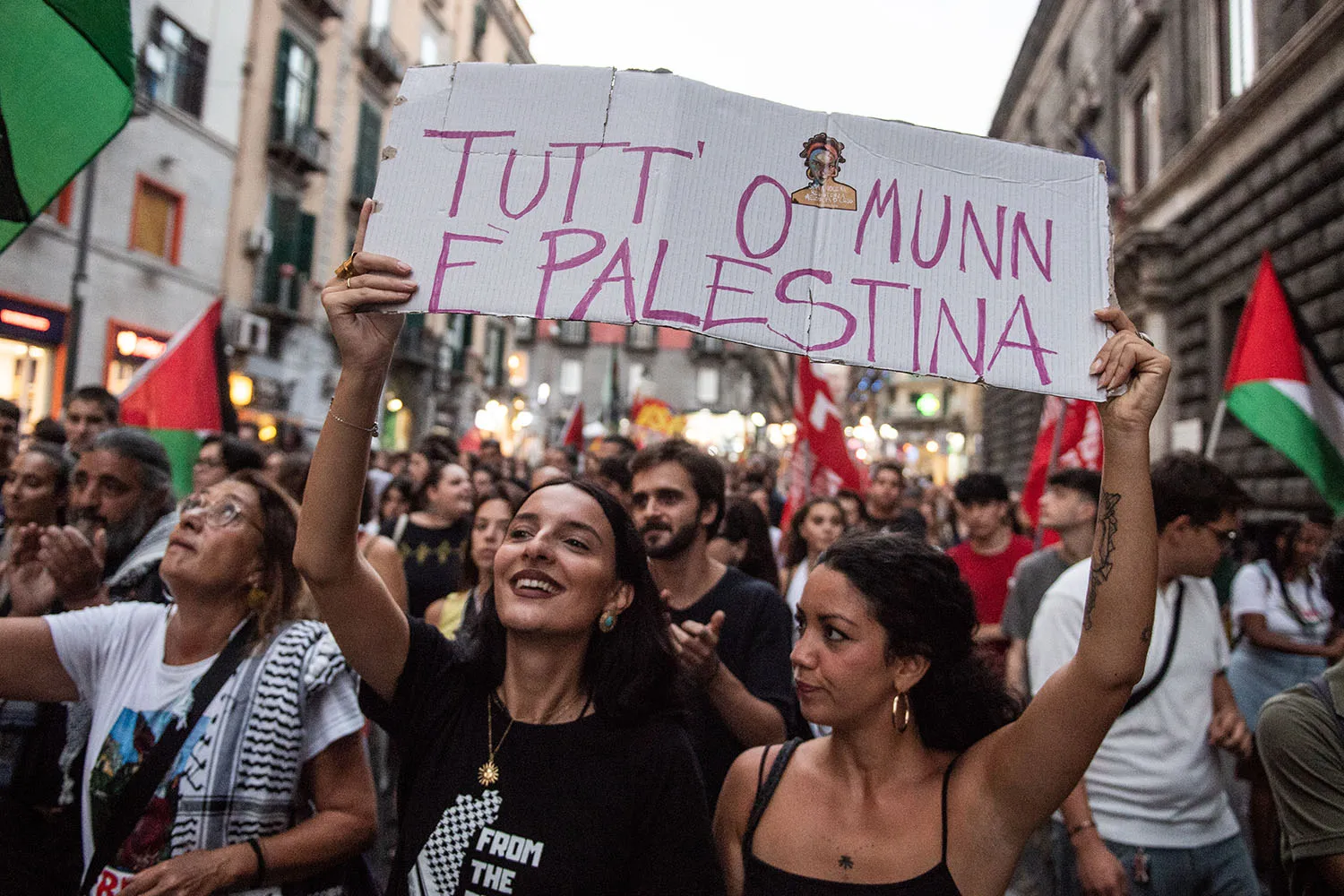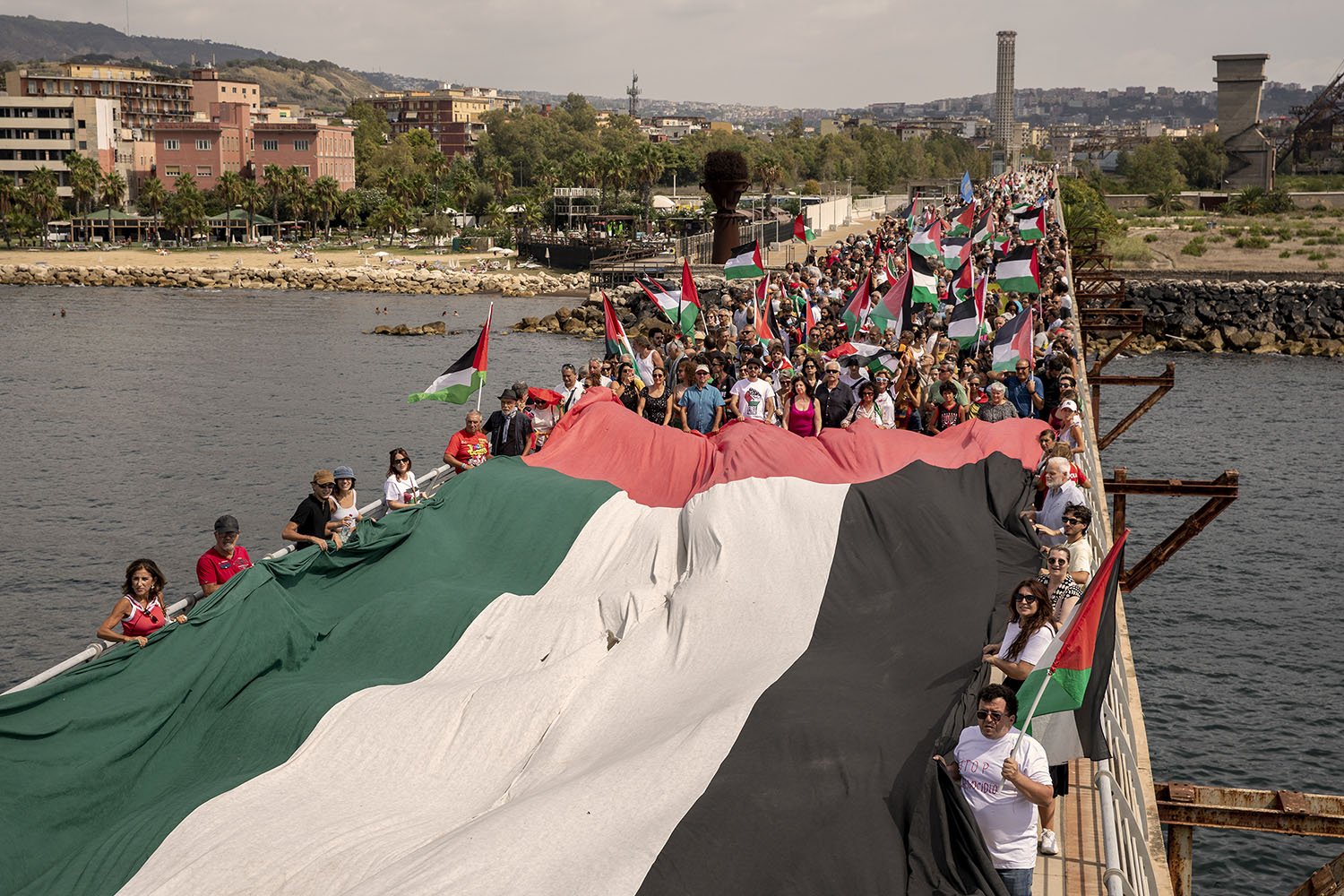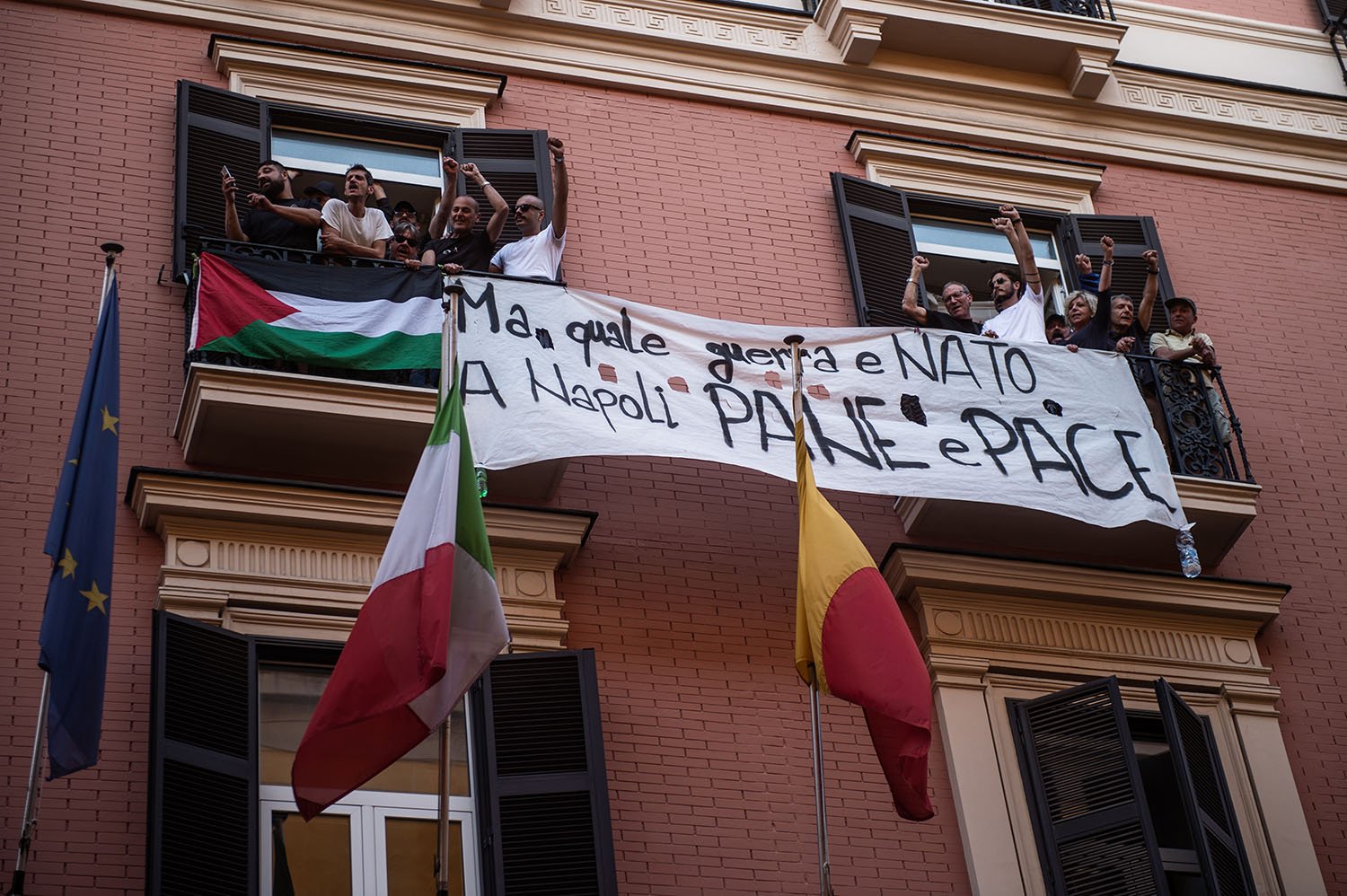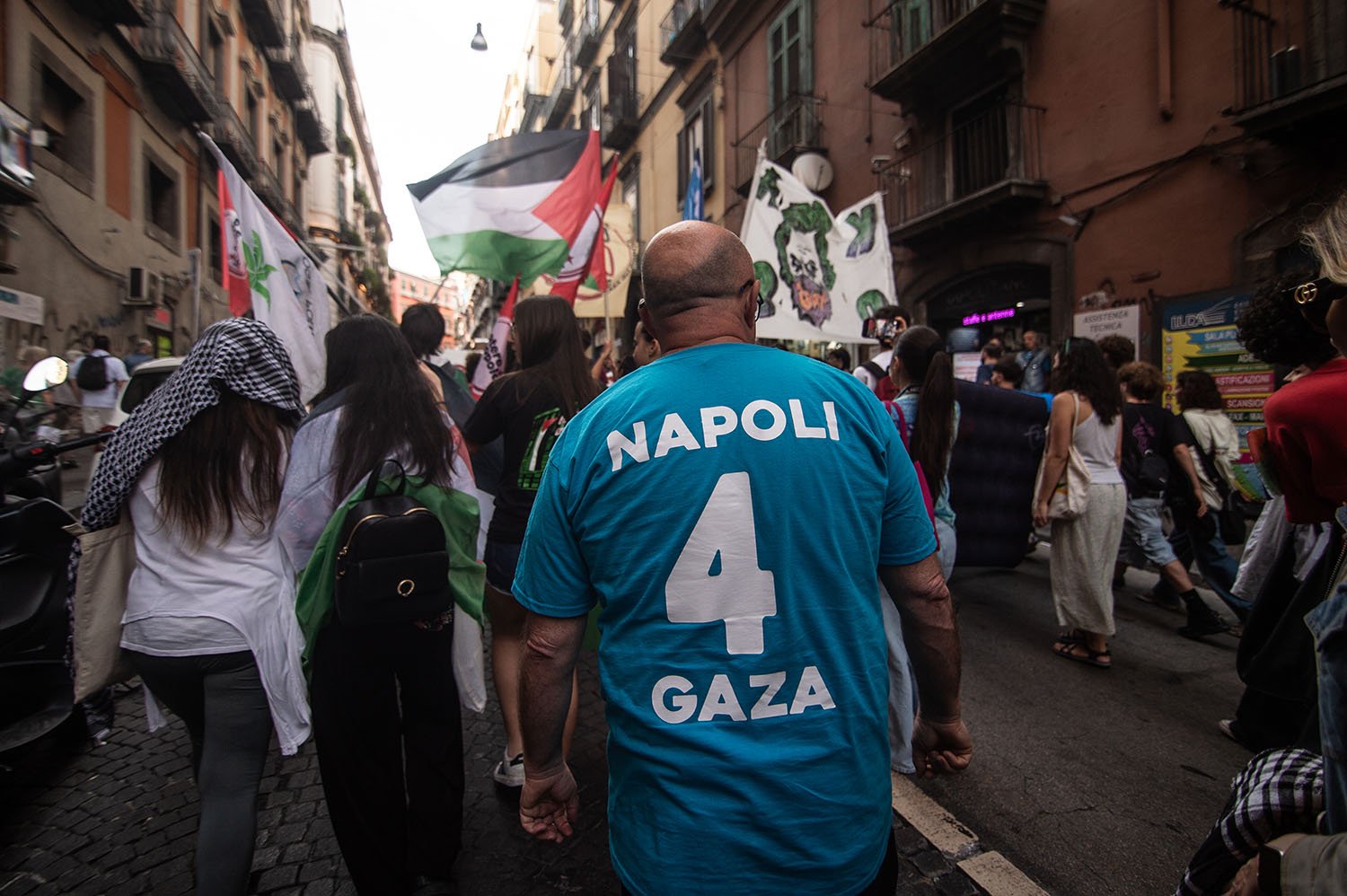NAPLES, Italy—During the final match for the scudetto, Italy’s most coveted soccer prize, in May, supporters of SSC Napoli paraded their team’s light blue flags alongside Palestinian flags and keffiyehs as they marched through the port city’s narrow alleyways.
For nearly two years, the colors of the Palestinian flag—red, white, green, and black—have been displayed in the front row of many public events in Naples, from soccer matches to concerts to community gatherings. Restaurants and bookstores in old alleys downtown carry watermelon stickers in their windows, a nod to the flag in the city’s most visited quarters.
Naples has been at the forefront of Europe’s citizen-led movements in support of Gaza since Oct. 7, 2023. While far-right Italian Prime Minister Giorgia Meloni has consistently voiced her support for the Israeli government over the past two years, even as she has occasionally condemned its military operations in Gaza, Neapolitans have been among Palestinians’ most vocal allies on the continent.
In September 2024, Vincenzo De Luca, the president of Campania—the southern Italian region whose capital is Naples—became the first Italian elected official to call Israel’s war in Gaza a “genocide.” And Naples’s city council approved a motion to officially recognize a Palestinian state in May, long before the national government began considering doing so.
“Naples and Palestine go side by side. The city’s rebel soul is very similar to the Palestinian one,” said Maisa al-Hassan, a Palestinian dentist who moved to Naples for university in the late 1980s. “Here, we’ve always found empathy and solidarity, because we share a similar love for our land that we always feel the need to protect and liberate from oppressors.”

Neapolitans have long felt a special solidarity with Palestinians. In recent decades, Naples’s historic center has become a kind of open-air museum of the Palestinian struggle, with dozens of murals by world-renowned artivists Ciro Cerullo (known as Jorit) and Eduardo Castaldo telling the story of Palestinian resistance.
Some of the murals simply depict important Palestinian figures, such as Palestine Liberation Organization leader Yasser Arafat and a young activist named Ahed Tamimi. Others are more elaborate: an older Neapolitan woman splashing Israel Defense Forces soldiers with water and a collage combining images of historic antisemitic propaganda from World War II with scenes from modern-day Israel.
“Since I was 13 years old, I remember that here in Naples, Palestine was perceived as the symbol of all world injustices at every political demonstration and used as a metaphor for our own social struggles,” Jorit said.
According to Claudia Fauzia, a Sicilian expert on southern Italian politics and identity, this connection is rooted in Neapolitans’ sense that they have, like Palestinians, historically been victims of oppression. The Italian south, Fauzia said, has long been “portrayed as backward … useful only as a reservoir of cheap labor and a captive market for consumption.”
The city’s history of resistance against occupation dates back to the establishment of the Italian state in the 19th century, when the northern kingdom of Sardinia-Piedmont annexed the southern kingdom of Two Sicilies during a process known as unification, which is still widely seen as a conquest in Naples and the south today. For decades afterward, the northern army brutally repressed southern revolts that were sparked in part by redistribution of wealth and agricultural resources from the south to the north.
Less than a century later, at the height of World War II, civilians ousted Nazi forces occupying Naples without the help of Allied forces in what later would be known as “the four days of Naples”—an episode often referenced by pro-Palestinian protest leaders to help highlight a parallel historical culture of resistance against occupiers. Al-Hassan, who has taken part in many of the protests, said that since the city’s first solidarity marches for Gaza after Oct. 7, “the mentioning of Naples’s own past would be a recurrent speech heard at protest squares.”
To this day, southern Italy still has the country’s highest rates of unemployment and poverty, and workers who flocked north in search of work have often faced discrimination.

Sofia Bacchini, a sociologist at the University of Naples whose research focuses on Palestinian student migration to Italy, said that many southern Italian workers started to identify with Palestinians’ struggle in the postwar period, especially after the 1967 Six-Day War, an Arab-Israeli conflict that cemented Israel’s military dominance in the region.
Thousands of Palestinian students migrated to Italy after 1967, encouraged by the country’s open borders and scholarship opportunities, as well as the government’s wider pro-Palestinian stance at the time. Their political activism led to the establishment of Italy’s Palestinian student union, which Bacchini said is the largest Palestinian university movement in Europe. The movement found many supporters outside the Arab community, especially in Naples—where, according to Bacchini, unofficial data shows that around 1,500 Palestinians live today.
“The local solidarity for Palestine among residents and civil society organizations was eased by political and institutional backing in Naples in recent years,” Bacchini said.
Naples has largely been led by leftist governments since 1993. In 2005, it became a sister city of Nablus, a city in the occupied West Bank whose name, like Naples, is also derived from the Greek word neapolis, or new city. In 2013, then-Mayor Luigi de Magistris made Mahmoud Abbas, president of the Palestinian Authority, an honorary citizen of Naples and, in return, accepted honorary Palestinian citizenship by receiving a Palestinian passport.

Recent polling shows that Italian public opinion is catching up to that of Neapolitans. In October 2024, the Italian Institute for International Political Studies found that 35 percent of the Italians it surveyed deemed Israeli Prime Minister Benjamin Netanyahu’s government responsible for the conflict. A June poll by YouGov showed a significant decrease in Italians’ support for Israel, with only 6 percent of respondents believing that Israel’s attacks in Gaza are justified.
That is reflected in the huge turnout for the Sept. 22 and Oct. 3 nationwide strikes to protest for Gaza, which largely shut down the country. In Naples, where turnout was among the highest in Italy, protesters managed to halt operations at the city’s main train station. Overall, more than 1 million Italians marched down streets, squares, and highways across the country, showing support and solidarity for Gaza and demanding that Meloni’s government denounce the genocide there.
Currently, nearly nine in 10 Italians want their country to recognize a Palestinian state, which Meloni still refuses to do, claiming in late September that it “would be a hazardous move.”

Today, the heart of Naples’s pro-Palestinian movement is the Handala Ali Cultural Center, a community space that seeks to spread awareness of the Arab-Israeli conflict and Palestinian culture. The center, founded in 2021, is located downtown in the working-class neighborhood of Forcella, in the same spot as the former bazaar of Palestinian refugee Ali Oraney. For 40 years, until his death in 2020, Oraney’s bazaar was a meeting point for leftist students and activists, who would often come to speak to him about life in Palestine.
Today, the renovated space has retained a cozy, open atmosphere in one of the city’s busiest areas. Every September, it hosts a small film and culture festival that screens independent Palestinian movies for free and hosts public talks and debates.
“Downtown Naples has heavily been impacted by overtourism recently,” said Giulia al-Omleh, an Italian Palestinian student and activist with the center. “We thought this represented the perfect place … for open-air debates, exhibits, and lectures, both for its symbolism of a past epicenter of the pro-Palestine student movement in Naples, but also because it’s a current strategic point where many people pass by.”
Al-Omleh, who is both Neapolitan and Palestinian, recognizes that despite the many parallels between the two communities, the injustice that Palestinians face on a daily basis is far greater than Neapolitans can imagine. “Here, people are not currently exposed to the occupation of a foreign entity, to mass displacement, or constant destruction,” she said. Still, “the history of this city is inseparable from its rebellious nature revolting against greedy bullies.”
And for many pro-Palestinian Neapolitans, it is more important than ever to preserve the city’s rebellious spirit today. “This is one of the most visited cities in the world,” Castaldo said. “Reclaiming it as an anti-Zionist space means reclaiming its identity of a place with a deep sense of social justice.”
The post Europe’s Unlikely Capital of the Palestinian Solidarity Movement appeared first on Foreign Policy.




